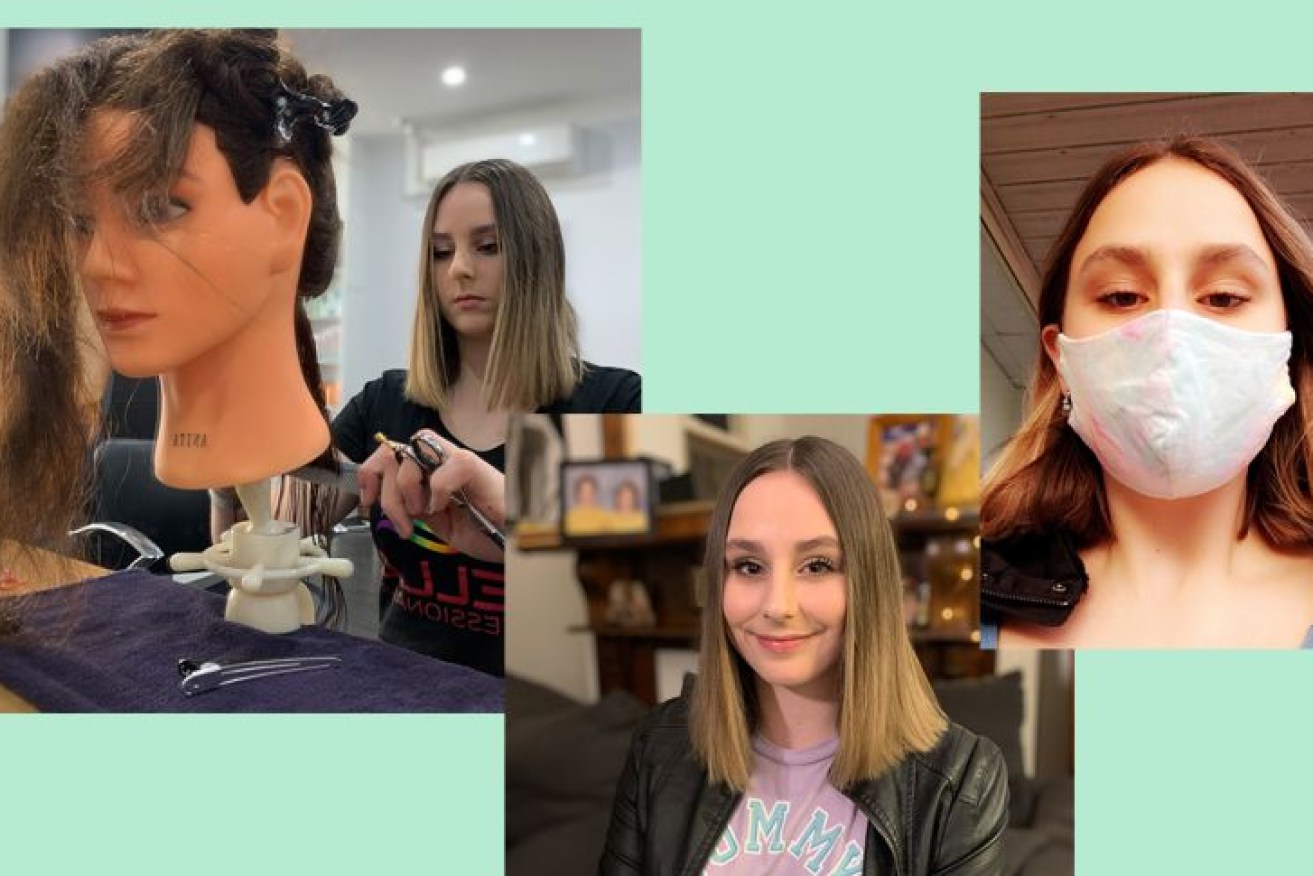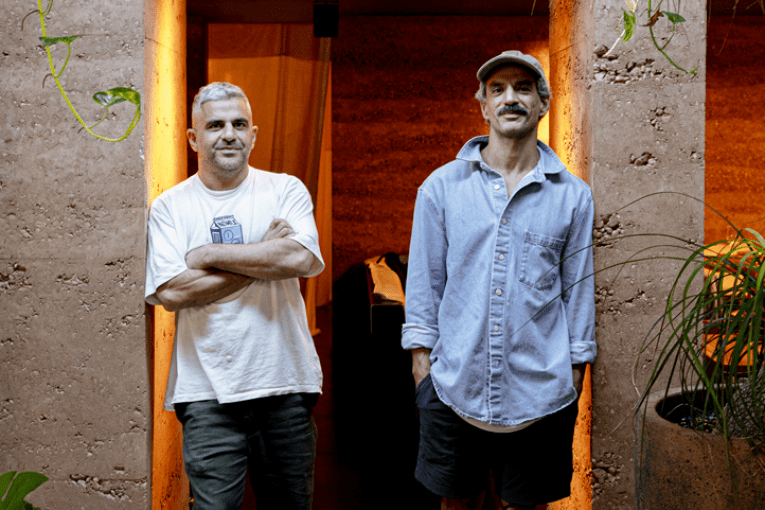Coronavirus pandemic may ‘scar’ COVID generation
Syrenite Hewson is 18 years old, and has not had a decent night’s sleep since March.

Syrenite Hewson is trying hard to keep her career on track with limited work opportunities.(ABC News: Michael Barnett / Supplied)
“I go to bed and I stare at the ceiling for three hours,” she said.
“I’ve never had anything like this happen to me. It’s just really weird. This is what isolation and losing my job has done.”
Before the pandemic, Syrenite had a clear plan for 2020 — to finish year 12, and her second year of a hairdressing apprenticeship, on her way to buying her first house in her early 20s.
In a matter of days, she had been made redundant by her salon in Warrnambool, in country Victoria, and was stuck in her bedroom — isolated and extremely anxious.
“It was just the fact that a lot just changed at once. It was quite scary,” she said.
“It was fear of getting the disease, fear of not being able to find work — and the fact that my schooling was suffering because of my issues with sleeping.”
Those fears for the future — particularly around the job market — are a constant thread in the responses of young Australians to the ABC’s Generation COVID Project.
‘The frontline of COVID-19 is young people’
They are the first generation to go through a crisis of this magnitude since World War II.
They have already borne the brunt of the job losses: 44 per cent of the jobs that have disappeared this year belonged to 15 to 24-year-olds.

Professor Janeen Baxter is concerned some less-advantaged young people will never be able to own a home or start a family due to the knock-on effects of the economic slowdown. (ABC News: Curtis Rodda)
The impact on their mental health has also been huge — with sharp rises in anxiety, depression, and demand on mental health services such as Headspace.
Professor Janeen Baxter, a leading social scientist from the University of Queensland, believes the scope and nature of the pandemic shutdown have no historical parallel.
“It’s a health crisis, it’s an economic crisis, it’s a political crisis, it’s a social crisis,” she said.
“What we’ve seen so far is unfortunately probably just the start of difficult times for young people,” University of Melbourne economist Professor Jeff Borland said.
There are two main groups of young people facing unemployment, according to Borland: those with part-time jobs who are still studying, and those who have already qualified and are trying to land their first full-time position.
He said the first group were likely to get their jobs back fairly soon if the recovery continued as forecast, but past experience suggested it was likely to be much harder for the second group.
“If you look at downturns in the 1980s and 1990s for example, it takes a couple of years to get to the peak,” he said.
“During those two years, you’ve got two whole cohorts of young people finishing education and trying to move into employment.
“They’re the group who are likely to be crowded out of employment in the next couple of years. And research suggests it’s going to affect them for up to a decade afterwards,” he said.
Emily Goode has the misfortune of straddling both these groups.

PhD student Emily Goode is concerned the young women she teaches will be worse off this year due to the isolation. (Photo: Supplied)
The 24-year-old engineer is in the data collection phase of her PhD in Bendigo, but the shutdown has scuttled her carefully conceived plans.
“I am struggling to collect results for surveys, from councils on water sensitive urban design, as I can’t connect directly with these councils.”
Goode has supported herself through teaching at the university, but like casual academics around the country, her hours have been reduced.
“I’m having to consider going into industry or an engineering firm and going part-time with my PhD,” she said.
But she hopes that will mean that she finishes her doctorate at a time when the academic economy has recovered, so she avoids the “crowded” competitive market Borland describes.
Mostly, she worries about her students.
“It’s the students dropping out of their course because they do not have that personal support, especially those female students. They already feel isolated in engineering and other STEM courses,” Goode said.
Dropping out of study is just one of the by-products of the shutdown that Baxter fears may have lifelong impacts on young people.
“It’s such a transitional time for them — moving out of home, buying their first house, getting a good job and establishing long-term relationships,” she said.
“These are critical life course stages. If they don’t happen smoothly, it then has consequences.”

Jacqui Fahry has won an award for her swimming teaching, but has been forced to slow down during the lockdown.(Photo: Supplied)
Western Sydney swimming school manager Jacqui Fahry is facing those consequences right now.
“I was planning on buying a house at the end of this year,” she said.
“Despite JobKeeper, my income has taken a big hit. I’ll just have to re-evaluate.”
However, being forced to spend time at home allowed her to re-evaluate more than her financial position.
“I did prioritise work over other things in my life before the shutdown. It sounds silly, but it did take not working for me to realise that,” she said.
The ‘scarring’ effect
Baxter said the financial and social supports around young people would play a key role in deciding how much the shutdown set them back.
“If they come from advantaged situations, this will just be a delay in those stages, but for other young people, it might not just be a delay, it may put them off track completely,” she said.
“They may never be able to afford to buy a house. If people delay having children, it may be that they never have children. That could well exacerbate what we’re already seeing in terms of the aging crisis, and the skills crisis in Australia.”

Professor Jeff Borland says young people should try and keep hold of the fact that “it isn’t about them” and they’ve been unlucky to be starting their careers right now. (Photo: ABC News: Michael Barnett)
Professor Borland calls it the “scarring” effect.
“Being unemployed today makes you more likely to have to spend periods out of work in the future. We think that’s to do with things like the atrophy of skills, or motivation,” he said.
“There may be stigma effects from employers, who see that someone’s been unemployed and are less likely to hire you.”
He said it was crucial to keep young people connected to the job market during the downturn.
“But it’s also important to recognise that it’s not an easy thing. I don’t think young people should be expected to be doing that by themselves,” he said.
“I think government really needs to be providing things like targeted wage subsidy programs that promote their chances of getting jobs, and internship programs that allow them to maintain contact with the labour market.
“They have had the great misfortune to be trying to find employment at a time when we’re having the worst economic downturn in Australia potentially since the Great Recession.
“They’ve got to have the mindset hopefully that they’ve been really, really unlucky in the timing, but this isn’t about them.”
‘It just takes one event to change your whole life’
Baxter has advice for young people who have been hit hard during the shutdown.
“Young people need to be thinking about the short-term supports that they need in terms of family, friends and networks that they can rely on,” she said.
“But also trying to think about some of the longer-term outcomes and perhaps think about retraining, think about what they can do to get their life back on track as quickly as possible.”
That’s exactly what Syrenite has done.
She spent most of May pounding the Warrnambool pavement, looking for another salon to take her on so she could complete her apprenticeship.
Three weeks ago, she finally landed a trial shift at a new salon and is now flat out doing her year 12 assessments and getting her apprenticeship back on track.
It’s a huge relief. But Syrenite said she has now realised “how fragile we all are”.
“It just takes one event to change your whole life,” she said.
“I didn’t think the virus would ever affect my job, or my schooling, or the connections I had with other people. I feel like I’ve lost contact with a couple of friends.
“I’ve grown a lot. I’ve learned a lot. Life’s a bit more messy than I knew it to be.”
– ABC / Sarah Curnow and Ben Knight












